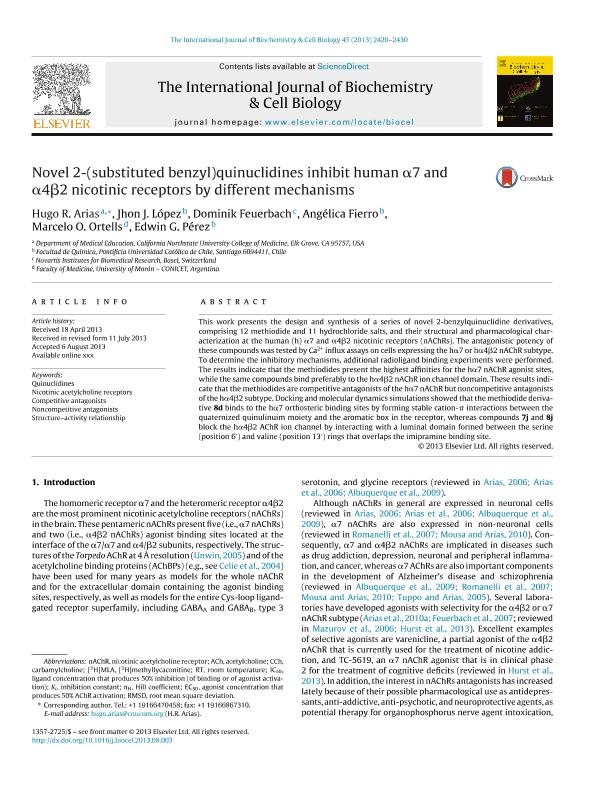Mostrar el registro sencillo del ítem
dc.contributor.author
Arias, Hugo Rubén

dc.contributor.author
López, Jhon J.
dc.contributor.author
Feuerbach, Dominik
dc.contributor.author
Fierro, Angélica
dc.contributor.author
Ortells, Marcelo Oscar

dc.contributor.author
Pérez, Edwin G.
dc.date.available
2017-09-19T18:36:44Z
dc.date.issued
2013-08
dc.identifier.citation
Arias, Hugo Rubén; López, Jhon J.; Feuerbach, Dominik; Fierro, Angélica; Ortells, Marcelo Oscar; et al.; Novel 2-(substituted benzyl)quinuclidines inhibit human α7 and α4β2 nicotinic receptors by different mechanisms; Elsevier; International Journal Of Biochemistry And Cellular Biology; 45; 11; 8-2013; 2420-2430
dc.identifier.issn
1357-2725
dc.identifier.uri
http://hdl.handle.net/11336/24611
dc.description.abstract
This work presents the design and synthesis of a series of novel 2-benzylquinuclidine derivatives, comprising 12 methiodide and 11 hydrochloride salts, and their structural and pharmacological characterization at the human (h) α7 and α4β2 nicotinic receptors (nAChRs). The antagonistic potency of these compounds was tested by Ca2+ influx assays on cells expressing the hα7 or hα4β2 nAChR subtype. To determine the inhibitory mechanisms, additional radioligand binding experiments were performed. The results indicate that the methiodides present the highest affinities for the hα7 nAChR agonist sites, while the same compounds bind preferably to the hα4β2 nAChR ion channel domain. These results indicate that the methiodides are competitive antagonists of the hα7 nAChR but noncompetitive antagonists of the hα4β2 subtype. Docking and molecular dynamics simulations showed that the methiodide derivative 8d binds to the hα7 orthosteric binding sites by forming stable cation-π interactions between the quaternized quinulinuim moiety and the aromatic box in the receptor, whereas compounds 7j and 8j block the hα4β2 AChR ion channel by interacting with a luminal domain formed between the serine (position 6?) and valine (position 13?) rings, that overlaps the imipramine binding site.
dc.format
application/pdf
dc.language.iso
eng
dc.publisher
Elsevier

dc.rights
info:eu-repo/semantics/openAccess
dc.rights.uri
https://creativecommons.org/licenses/by-nc-sa/2.5/ar/
dc.subject
Nicotinic Acetylcholine Receptors
dc.subject
Competitive Antagonists
dc.subject
Noncompetitive Antagonists
dc.subject
Quinuclidines
dc.subject
Structure–Activity Relationship
dc.subject.classification
Bioquímica y Biología Molecular

dc.subject.classification
Ciencias Biológicas

dc.subject.classification
CIENCIAS NATURALES Y EXACTAS

dc.subject.classification
Otras Ciencias Químicas

dc.subject.classification
Ciencias Químicas

dc.subject.classification
CIENCIAS NATURALES Y EXACTAS

dc.title
Novel 2-(substituted benzyl)quinuclidines inhibit human α7 and α4β2 nicotinic receptors by different mechanisms
dc.type
info:eu-repo/semantics/article
dc.type
info:ar-repo/semantics/artículo
dc.type
info:eu-repo/semantics/publishedVersion
dc.date.updated
2017-09-19T14:24:31Z
dc.journal.volume
45
dc.journal.number
11
dc.journal.pagination
2420-2430
dc.journal.pais
Países Bajos

dc.journal.ciudad
Ámsterdam
dc.description.fil
Fil: Arias, Hugo Rubén. University of California; Estados Unidos. Consejo Nacional de Investigaciones Científicas y Técnicas; Argentina
dc.description.fil
Fil: López, Jhon J.. Pontificia Universidad Católica de Chile; Chile
dc.description.fil
Fil: Feuerbach, Dominik. Novartis Institutes for Biomedical Research; Suiza
dc.description.fil
Fil: Fierro, Angélica. Pontificia Universidad Católica de Chile; Chile
dc.description.fil
Fil: Ortells, Marcelo Oscar. Universidad de Morón. Facultad de Medicina; Argentina. Consejo Nacional de Investigaciones Científicas y Técnicas; Argentina
dc.description.fil
Fil: Pérez, Edwin G.. Pontificia Universidad Católica de Chile; Chile
dc.journal.title
International Journal Of Biochemistry And Cellular Biology

dc.relation.alternativeid
info:eu-repo/semantics/altIdentifier/doi/http://dx.doi.org/10.1016/j.biocel.2013.08.003
dc.relation.alternativeid
info:eu-repo/semantics/altIdentifier/url/http://www.sciencedirect.com/science/article/pii/S1357272513002562
Archivos asociados
